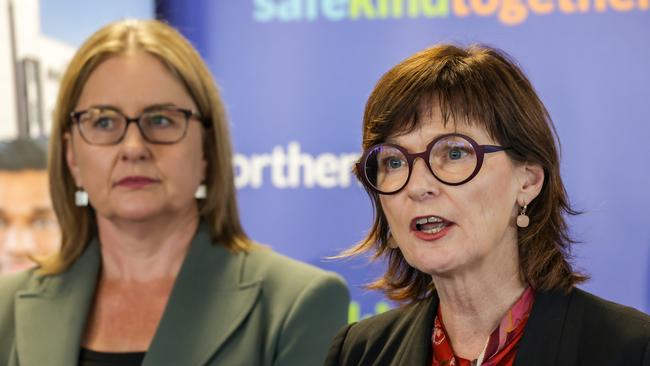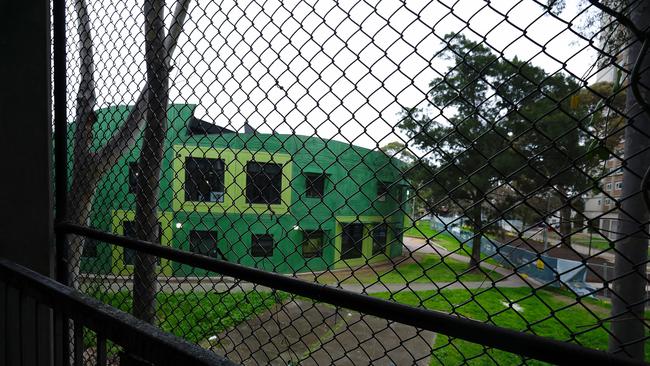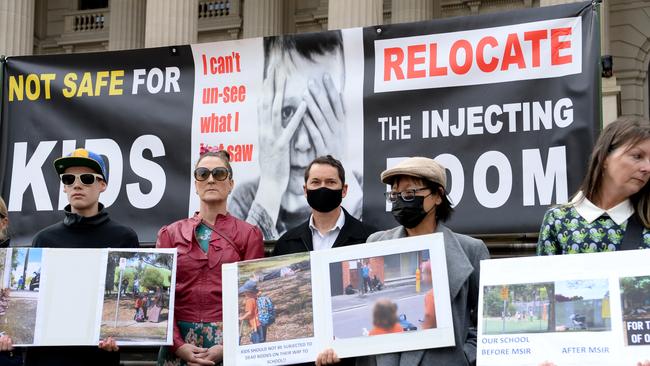Victorian Premier Jacinta Allan has ruled out a second injecting room in Melbourne’s CBD
The Victorian government has rejected establishing a second safe injecting facility in the city, as Jacinta Allan concedes finding a suitable location was too difficult.
The battlelines have been drawn between Victorian Labor and the Greens over the rejected second supervised injecting centre, setting the scene for a political showdown over the next 2½ years across inner-suburb electorates.
The Greens hold four inner-city seats of Melbourne, Brunswick, Prahran and Richmond and hope to win others, including Northcote, from Labor at the 2026 election.
Labor’s support for drug injecting centres, including establishing the first centres in Richmond, was part of a political strategy to defend its inner-city heartland where Greens support is strongest.
Premier Jacinta Allan’s decision announced on Tuesday to reject a city-based drug injecting centre throws the Greens a potential vote-winning issue among progressive inner-city voters.
Assuming the role as the new state Greens leader on Tuesday, Melbourne MP Ellen Sandell was scathing in her response to the government.
“This is cowardly from Labor. It leaves people who are struggling with heroin addiction to die on the streets of Melbourne, and the local community and families having to deal with the consequences because the Labor state government won’t do anything to help,” Ms Sandell said.

“Labor under Jacinta Allan seems to be backtracking on any progressive reforms introduced under Daniel Andrews.”
The Greens said that, under the premiership of Ms Allan, the government would not act “unless their feet are held to fire”.
“I don’t know why Labor persists with their failed drug policies that do not work,” Ms Sandell said.
In slamming the shift in policy, the minor party highlighted its previous calls for injecting rooms in Melbourne, Dandenong, St Kilda and Geelong.
Rather than establish a new injecting site, Labor has opted to spend $95.11m on a statewide plan to reduce drug-related harm.
It came as former police commissioner Ken Lay recommended a trial for a medically supervised injecting centre in the city be made up of 4-6 small booths for a “discreet injecting service” with wraparound support.
His four-year report has cost Victorians $270,000.
The Premier said a second site was “not our plan”, and conceded that finding a suitable location for the site was too difficult.
“The location has been a key sticking point. We have been unable to find a location that strikes the right balance … between supporting people who use drugs with the needs of the broader community,” Ms Allan said. “We are unwilling to spend more time when we have the opportunity to take action now.”

An initial list of 50 sites was put together before 104 A’Beckett St, 340 Flinders St and 244 Flinders St were short-listed.
Ms Allan said the decision to reject a second centre was made at cabinet on Monday afternoon.
Under the government’s new plan, $36.4m will be invested to establish a community health hub at 244 Flinders St and $9.4m will go toward providing drug users with critical services.
An investment of $7.2m for a hydromorphone treatment at the hub and $8.4m for expanding pharmacotherapy will also form part of the action plan.
Initiatives that go beyond the Lay recommendations include a trial of 20 naloxone vending machines, an overdose-reversal medicine, and establishing an Australian-first overdose prevention and response helpline.
Paul MacCartney, a GP who specialises in drug management, said there are “mixed emotions” over the plan.
“There’s evidence that injecting rooms save lives,” he said.
“We will continue to advocate … that supervised injection rooms be part of the suite of treatments available in Victoria.”

Monash Addiction Research Centre director Dan Lubman said supervised injecting services were effective harm-reduction and lifesaving initiatives.
“These services ensure people do not fatally overdose, and reduce demand on ambulance emergency services,” he said.
Victorian Chamber of Commerce and Industry chief executive Paul Guerra applauded the government for being able to “thread the right passage” with its decision to implement a community safety hub rather than an injecting room.
“When we spoke to business, they didn’t want an injection room on their doorstep because it would have impacted not only their business, but tourism in that particular area as well,” Mr Guerra said.







To join the conversation, please log in. Don't have an account? Register
Join the conversation, you are commenting as Logout